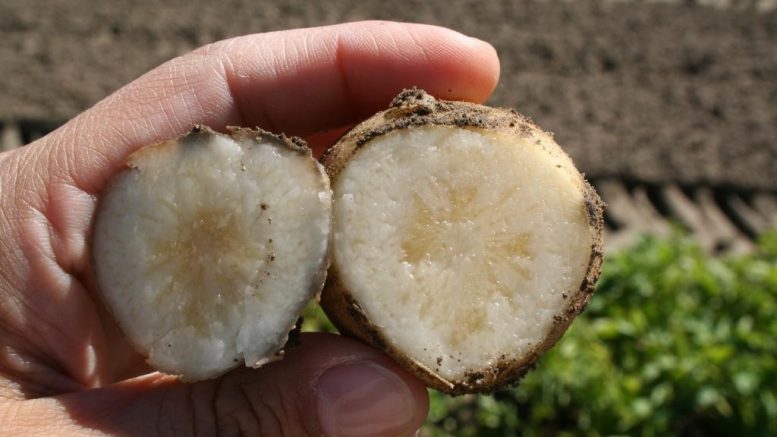Phytosanitary Emergency Was Declared for 12 Months in Peru
Brazil
Anvisa publishes the withdrawal of pesticide evaluation request of technical amicarbazone from Adama. (Anvisa)
Mines and Energy Committee of the Chamber of Deputies (Brazilian Lower House of Congress) has approved Bill No. 699/23, which establishes the Fertilizer Industry Development Program – Profert. The initiative grants tax benefits to create a national fertilizer park. The objective is to implement, expand or modernize fertilizer and input production units. Projects must follow the guidelines of the National Fertilizer Plan (PNF 2022-2050), created in 2022. (Agência Câmara de Notícias)
Ministry of Agriculture has closed a clandestine fertilizer factory in São Roque, State of São Paulo, in an operation carried out on October 8th and 9th, with the assistance of federal agricultural inspectors from the region of Araraquara, São Paulo. Approximately 40 tonnes of bulk fertilizers, as well as 500 bags containing 25 kg of products ready to be sold, were seized. (MAPA)
Ministry of Agriculture has published a letter requesting the Brazilian Institute of Environment and Renewable Natural Resources – Ibama “to urgently evaluate products based on the active ingredient spidoxamat”, to control greening (HLB). The Ministry highlights the need to prioritize the evaluation of these products, which have already been evaluated by Anvisa. Greening is caused by the bacterium Candidatus Liberibacter asiaticus, classified as being of “Very High Risk” to agriculture, while the insect vector, Diaphorina citri, is classified as being “High Risk”. (MAPA)
Research shows the insects that most concern soybean and corn farmers are the Euschistus heros brown stink bug, considered by 84% of farmers as one of the most dangerous insects, followed by Diceraeus sp. (82%) and the fall armyworm, Spodotera frugiperda (67%). (Kynetec; FMC)
In compliance with court decision, Anvisa approves the toxicological evaluation of triclopyr-butyl 667 g/L EC (Proregistros); clomazone 360 g/L, isoxaflutole 750 g/kg WG (Biorisk); trifloxystrobin 100 + tebuconazole 200 g/L SC (Cropchem). (Anvisa)
Federal Government has launched the National Plan for the Reduction of Agrochemicals, with the aim of removing highly toxic agrochemicals from the market. The strategy aims to replace these substances with bioinputs and is part of the National Plan for Agroecology and Organic Production. (Federal Government; MAPA)
Luft Logistics Agribusiness was the target of a lawsuit filed by the Public Prosecutor’s Office of the State of Mato Grosso, requesting US$ 7.01 million in compensation for the damage caused by fires that occurred in the city of Sorriso. The fire was caused by the irregular storage of pesticides, which resulted in the contamination of the area’s soil, water table and atmospheric air, covering the city with toxic smoke. In addition, the company will have to comply with additional rules: pesticides can no longer be stored in places with permeable floors or in places without coverage, other kinds of products can not be stored in pesticide storages, etc. (Public Prosecutor’s Office of the State of Mato Grosso)
Institute of Agricultural Economics from the State of Mato Grosso has released an update report on the corn in the State. From August to September, the cost of fertilizers for the 2025 season increased by 1.65%. “This increase in costs was driven by the increase in the price of urea, due to the conflicts in the Middle East. Furthermore, in the last month, the greater demand for urea, caused by the proximity of the planting of the 2nd harvest, contributed to the increase in value of the input”. (IMEA)
Fertilizers Heringer informed that it will hibernate two manufacturing sites, due to the low financial performance and the low perspective of economic viability of the units amid the current market scenario. The plants in Dourados, State of Mato Grosso do Sul, and Rosário do Catete, State of Sergipe, will be gradually hibernated, with the progressive reduction of their operations over the next few months. (Fertilizantes Heringer)
Chamber of Foreign Commerce removed from the agenda the request from the Brazilian Chemical Industry Association to increase the import tariff on ammonium nitrate from 0% to 15%. Last week, the Brazilian Fertilizer Mixers Association took a stance against Abiquim’s request. According to the entity, taxing the import of an exempt product would increase the cost of raw materials for the production of nitrogen fertilizers in Brazil. (AMA Brasil; Camex)
According to Flavio Hirata, partner at the pesticide registration consulting firm AllierBrasil, the time taken to approve pesticide registrations inhibits competition and discourages investment in Brazil. (AllierBrasil)

Latin America
Recently found in Brazil, the African leafhopper (Leptodelphax maculigera) has now also been detected in Santa Fe and Entre Ríos, Argentina, where nymphs and adult insects were observed in wheat plants. This species, originally from Africa, is capable of carrying viruses such as striate mosaic and fine streak, and surveillance in crops is recommended. “The African leafhopper is known to be an oligophagous species, that is, it can feed on grasses, pastures and legumes”, said Melina Almada, researcher at the National Institute of Agricultural Technology. (INTA; UNLP)
Andermatt announced the acquisition of 80% of the stocks of Agricheck Srl, from Argentina, focused on biocontrol and precision technology for agriculture. Carlos Gajardoni, CEO of Andermatt Brasil, said that the union will allow them to offer more innovative and sustainable solutions for farmers in the region. (Andermatt Group Ag; Agricheck Srl)
Nicolás Bronzovich is the new president of the National Institute of Agricultural Technology of Argentina. (INTA)
Phytosanitary emergency was declared for 12 months in Peru to contain the bacteria Candidatus Liberibacter solanacearum, which is affecting potato crops, declaring a phytosanitary emergency for 12 months. The pest has only been detected in Huancabamba, Piura, and is spread by the vector Bactericera cockerelli. The measures include surveillance, quarantine and a ban on the transport of potato tubers from infected areas, in addition to the mandatory elimination of contaminated plants and vector hosts. (Midagri; Senasa)
In the Huánuco region, Peru, alarming levels of agrochemicals have been found in foods such as potatoes, carrots and onions, with the presence of pesticides that exceed permitted limits, including glyphosate. (Senasa)

READ MORE:

